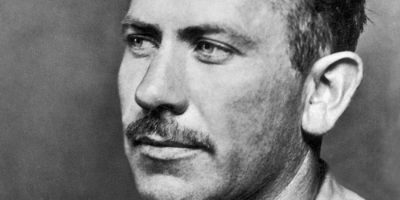Everything You Need To Know About The Sandwich Inventor: John Montagu
Enter the interesting world of John Montagu, the 4th Earl of Sandwich, a rare individual whose name conjures up both culinary brilliance and aristocratic grandeur. Behind his prestigious title is a man whose gambling addiction sparked a gastronomic revolution and indelibly etched his mark in culinary history.
Montagu came up with the ingenious notion of sandwiching delectable meats between two slices of bread, elevating the mundane act of eating into an art form with a distinct blend of elegance and audacity.
He was an ardent patron of the arts, a daring traveller, and a believer in exploratory expeditions, in addition to his culinary prowess. Prepare to journey through the remarkable life of John Montagu, a man whose contributions transcend time and taste.
1. John Montagu was the son of Viscount Hinchingbrooke

Edward Montagu, 1st Earl of Sandwich by Sir Peter Lely.jpg Peter Lely, Public domain, via Wikimedia Commons
Viscount Hinchingbrooke was a British Army soldier and politician who served in the House of Commons from 1713 to 1722. On July 7, 1692, he was born, and on October 3, 1722, he died.
Hinchingbrooke was the eldest son of Edward Montagu, 3rd Earl of Sandwich and Elizabeth, a descendant of the Rochester dynasty. Hinchingbrooke was able to handle his family’s public affairs because his mother kept his father, who was widely assumed to be insane, entirely isolated.
John at the age of 10, succeeded his grandfather Edward Montagu, 3rd Earl of Sandwich as Earl of Sandwich in 1729.
2. Sandwich was the ambassador of the Dutch Republic during the Treaty of Aix-la-Chapelle

John Montagu, 4th Earl of Sandwich by Johann Zoffany.jpg Johann Zoffany, Public domain, via Wikimedia Commons
In 1746, the Congress of Breda designated him as a plenipotentiary, and he engaged in peace talks there until the Treaty of Aix-la-Chapelle was concluded in 1748. Sandwich was also designated ambassador to the Dutch Republic during the discussions.
Sandwich outwitted his French partner by intercepting the latter’s covert correspondence using British secret service gear. Because of his service at Breda, he gained the attention of the influential Thomas Pelham-Holles, 1st Duke of Newcastle, who lobbied for him to be awarded a prestigious office when he came home.
Read On 10 Historical Events That Happened on May 11th
3. In 1748 Montagu became First Lord of the Admiralty
In February 1748, he was appointed First Lord of the Admiralty, a position he held until June 1751. By 1751, Newcastle had grown suspicious of Sandwich and his ties to The Duke of Bedford, whom Newcastle saw as a rival. Newcastle once admired Sandwich for his forthright and outspoken opinions.
Newcastle arranged for the firing of both of them by shooting Sandwich. Newcastle expected Bedford to leave in protest, giving him the opportunity to replace them with people he believed were more genuinely committed to him.
4. Sandwich became Secretary of State for the Northern Department in 1763
Sandwich was named Secretary of State for the Northern Department during the administration of George Grenville, who had taken over for Bute in August 1763. While in this post, he was instrumental in the successful prosecution of radical MP John Wilkes for obscene libel.
Although he and Wilkes are claimed to have been members of the notorious Hellfire Club, also known as the Monks of Medmenham, new research reveals that their relationship was less close-knit than previously imagined.
Sandwich’s acts were eerily similar to those of Jemmy Twitcher, the betrayer of Macheath in John Gay’s The Beggar’s Opera, which premiered at Covent Garden shortly after, and Sandwich became inextricably linked to that moniker. Wilkes later got expelled from the House of Commons.
5. He was one of the leaders who incited the American Revolutionary War

Revolutionary War (collage).jpg Eugène Lami, Public domain, via Wikimedia Commons
Sandwich made an effort to engage George III in naval concerns by commissioning a number of ship models including a model of Chatham Dockyard in 1774, just three years into his third tenure.
Sandwich’s general management of the navy in the years leading up to and during the American War of Independence, however, has historically been criticized for being inept since not enough ships were prepared for the start of the war with France in 1778.
Sandwich vehemently opposed a proposal for British America made by Benjamin Franklin and the Earl of Chatham in 1775. Sandwich favoured a plan of concentrating the British navy in European seas to thwart invasion when Britain and France went to war, in contrast to his colleague Lord Germain, who campaigned for more ships to be dispatched to North America.
The government generally adopted Sandwich’s strategy, keeping naval ports and footholds along the American coast while keeping the majority of the fleet at home. When Spain sided with France in the war in 1779, adding to the Bourbon fleets’ numerical edge over the Royal Navy, Sandwich’s problems grew.
Read On 15 Historical Facts about the French and Indian War
6. Montagu was incompetent and corrupt
Sandwich ceased to exist in 1782. Sandwich held a number of significant positions throughout his career, but his corruption and incompetence were infamous, leading to the adage “Seldom has any man held so many offices and accomplished so little.”
Some historians have recently started to argue that Lord Sandwich may not have been as incompetent as previously thought, but that earlier studies overemphasized evidence from his political rivals.
7. The modern sandwich is named after Lord Sandwich

Bombay cheese sandwitch.jpg Wind Hashira, CC BY-SA 4.0, via Wikimedia Commons
Although Lord Sandwich is credited with creating the modern sandwich, it is still unclear exactly when and how it was first used. The common idea that Lord Sandwich survived at the gaming table on bread and meat was started by a rumour in Pierre-Jean Grosley’s 18th-century travelogue Tour to London.
According to legend, Lord Sandwich was an extremely skilled gambler who spent long hours at the card table without stopping for a meal. As a result, he developed a practice that was well-known among his gambling pals in which he would request his staff deliver him pieces of meat between two slices of bread. According to this story, more people started asking for “the same as a Sandwich!” and the “sandwich” was born.
Read On Where to Buy the Best French Sandwiches in Paris
8. Lord Sandwich was a great supporter of Captain James Cook

Captainjamescookportrait.jpg Nathaniel Dance-Holland, Public domain, via Wikimedia Commons
Captain James Cook enjoyed the support of Lord Sandwich. Sandwich, who served as First Lord of the Admiralty, authorized the use of Admiralty funds to buy and outfit the Resolution, Adventure, and Discovery for Cook’s second and third Pacific Ocean exploratory missions.
Additionally, he scheduled a meeting with the King—an extraordinary honour for a lower-ranking officer. Cook gave Sandwich’s name to the Sandwich Islands (Hawaii), the South Sandwich Islands (in the Southern Atlantic Ocean), Montague Island (in the Gulf of Alaska), and Montague Island (off the southeast coast of Australia). The Montagu family’s home served as the inspiration for the name of Hinchinbrook Island.
The many gifts Cook gave Lord Sandwich were bequeathed to Trinity College at the University of Cambridge. Additionally, he met the young Ra’iatean Omai that Cook had brought to Europe and hosted him for a week at his country residence while giving him an armoured suit.
9. Montagu loved cricket

Lords – June 2011 – E v SL – Matt Prior Off for a Smashing Time (5858566308).jpg Gareth Williams from Redhill, England, CC BY 2.0, via Wikimedia Commons
Sandwich loved cricket, just like his pals George Montagu-Dunk, 2nd Earl of Halifax, and John Russell, 4th Duke of Bedford. In 1741, Sandwich and Halifax formed the Northamptonshire & Huntingdonshire team, which twice defeated Bedfordshire, first at Woburn Park and then at Cow Meadow, Northampton. At the time, Sandwich served as the team’s patron and captain for the Huntingdonshire county team.
10. Montagu loved ancient music
Sandwich’s focus shifted to music after his naval duty. He became a strong supporter of “ancient music,” which he defined as music that was older than 20 years. He founded a “Catch Club” where professional singers would perform “ancient” and contemporary catches, glees, and madrigals.
He was Felice Giardini’s sponsor, an Italian violinist. At his estate, he also staged performances of George Frideric Handel’s odes, masques, and oratorios. Sandwich had a key role in organizing the Concert of Ancient Music, the first event to feature a canonical repertory of classical music.
In the culinary world, the name John Montagu, 4th Earl of Sandwich, is considered a symbol of culinary creativity. The sandwich, his innovation, grew from humble beginnings to become an international hit, forever changing the way we eat on the go.
Montagu’s legacy, which spans from gaming tables to kitchens around the world, continues to amaze and inspire us, acting as a continual reminder of the power of a simple yet brilliant concept. Long live the Earl of Sandwich, a culinary pioneer whose name will live on in our hearts forever.
Read On Everything you need to know about Parisian sandwich shops
Planning a trip to Paris ? Get ready !
These are Amazon’s best-selling travel products that you may need for coming to Paris.
Bookstore
- The best travel book : Rick Steves – Paris 2023 – Learn more here
- Fodor’s Paris 2024 – Learn more here
Travel Gear
- Venture Pal Lightweight Backpack – Learn more here
- Samsonite Winfield 2 28″ Luggage – Learn more here
- Swig Savvy’s Stainless Steel Insulated Water Bottle – Learn more here
Check Amazon’s best-seller list for the most popular travel accessories. We sometimes read this list just to find out what new travel products people are buying.









